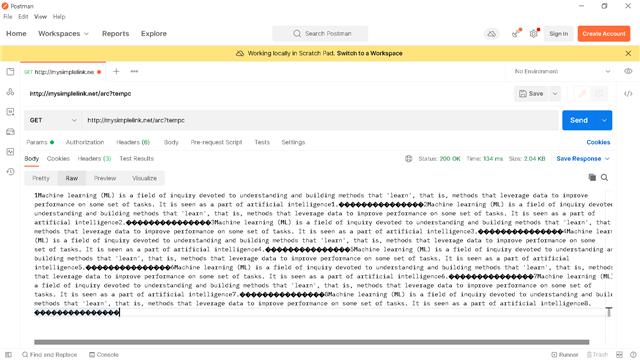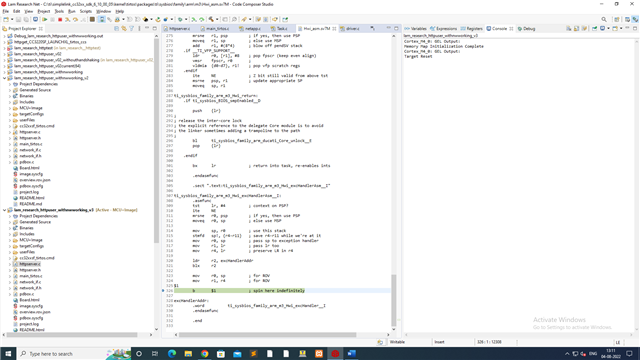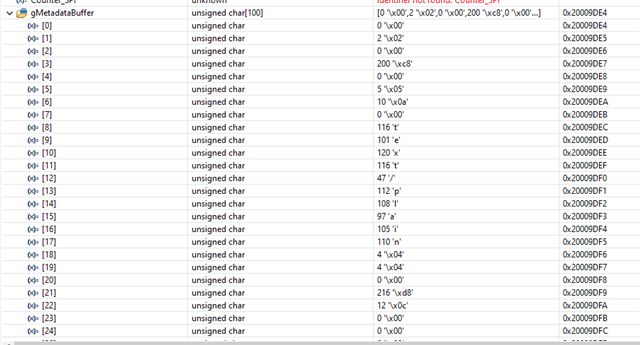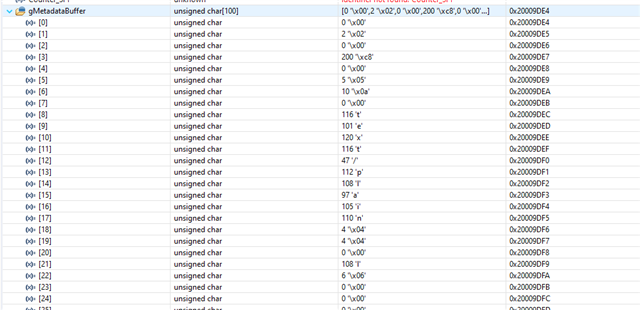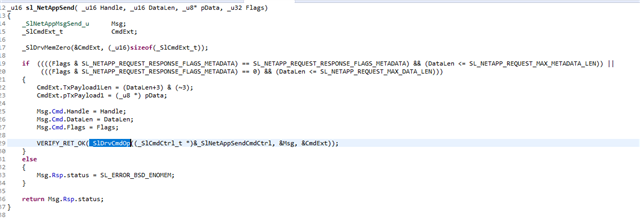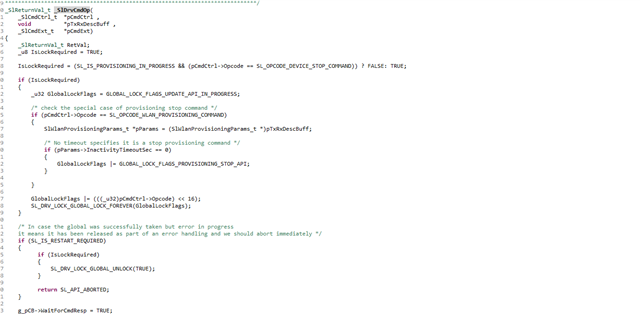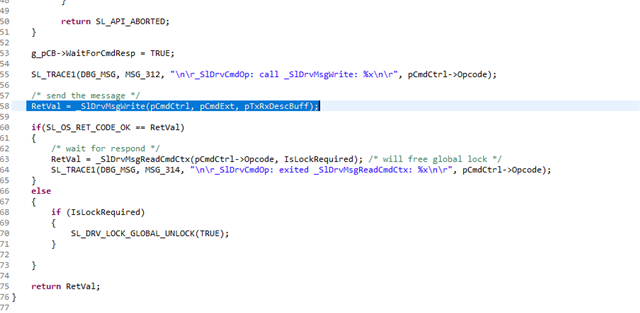Other Parts Discussed in Thread: CC3220SF
Hi,
I am trying to send the http message from CC3220SF Http Server to a Laptop based http client where CC3220SF also working as access point. I have to send huge data (approx 10kB) in response for each http request. I tried sending 2kB with 4 fragments of each size 500B (total 2kB) which is working fine and the code is as below -
int32_t dataGetCallback(uint8_t requestIdx, uint8_t *argcCallback, uint8_t **argvCallback, SlNetAppRequest_t *netAppRequest)
{
uint8_t *pPayload;
uint16_t metadataLen, sendDatalen;
char sendDataStr1[500] = "1Machine learning (ML) is a field of inquiry devoted to understanding and building methods that 'learn', that is, methods that leverage data to improve performance on some set of tasks. It is seen as a part of artificial intelligence. Machine learning algorithms build a model based on sample data, known as training data, in order to make predictions or decisions without being explicitly programmed to do so1.";
char sendDataStr2[500] = "2Machine learning (ML) is a field of inquiry devoted to understanding and building methods that 'learn', that is, methods that leverage data to improve performance on some set of tasks. It is seen as a part of artificial intelligence. Machine learning algorithms build a model based on sample data, known as training data, in order to make predictions or decisions without being explicitly programmed to do so2.";
char sendDataStr3[500] = "3Machine learning (ML) is a field of inquiry devoted to understanding and building methods that 'learn', that is, methods that leverage data to improve performance on some set of tasks. It is seen as a part of artificial intelligence. Machine learning algorithms build a model based on sample data, known as training data, in order to make predictions or decisions without being explicitly programmed to do so3.";
char sendDataStr4[500] = "4Machine learning (ML) is a field of inquiry devoted to understanding and building methods that 'learn', that is, methods that leverage data to improve performance on some set of tasks. It is seen as a part of artificial intelligence. Machine learning algorithms build a model based on sample data, known as training data, in order to make predictions or decisions without being explicitly programmed to do so4.";
char sendDataStr5[500] = "4Machine learning (ML) is a field of inquiry devoted to understanding and building methods that 'learn', that is, methods that leverage data to improve performance on some set of tasks. It is seen as a part of artificial intelligence. Machine learning algorithms build a model based on sample data, known as training data, in order to make predictions or decisions without being explicitly programmed to do so5.";
pPayload = gPayloadBuffer;
sl_Memcpy (pPayload, sendDataStr1, sizeof(sendDataStr1));
pPayload += sizeof(sendDataStr1);
/* NULL terminate the payload */
*(pPayload) = '\0';
sendDatalen = sizeof(sendDataStr1) + sizeof(sendDataStr2) + sizeof(sendDataStr3)+ sizeof(sendDataStr4); //+sizeof(sendDataStr5);
metadataLen = prepareGetMetadata(0, sendDatalen, HttpContentTypeList_TextPlain);
pthread_mutex_lock(&spiMutex);
sl_NetAppSend (netAppRequest->Handle, metadataLen, gMetadataBuffer, (SL_NETAPP_REQUEST_RESPONSE_FLAGS_CONTINUATION | SL_NETAPP_REQUEST_RESPONSE_FLAGS_METADATA));
sl_NetAppSend (netAppRequest->Handle,sizeof(sendDataStr1), gPayloadBuffer, SL_NETAPP_REQUEST_RESPONSE_FLAGS_CONTINUATION); /* mark as last segment */
pPayload = gPayloadBuffer;
sl_Memcpy (pPayload, sendDataStr2, sizeof(sendDataStr2));
pPayload += sizeof(sendDataStr2);
/* NULL terminate the payload */
*(pPayload) = '\0';
sl_NetAppSend (netAppRequest->Handle,sizeof(sendDataStr3), gPayloadBuffer, SL_NETAPP_REQUEST_RESPONSE_FLAGS_CONTINUATION); /* mark as last segment */
pPayload = gPayloadBuffer;
sl_Memcpy (pPayload, sendDataStr3, sizeof(sendDataStr3));
pPayload += sizeof(sendDataStr3);
/* NULL terminate the payload */
*(pPayload) = '\0';
sl_NetAppSend (netAppRequest->Handle,sizeof(sendDataStr3), gPayloadBuffer, SL_NETAPP_REQUEST_RESPONSE_FLAGS_CONTINUATION); /* mark as last segment */
pPayload = gPayloadBuffer;
sl_Memcpy (pPayload, sendDataStr4, sizeof(sendDataStr4));
pPayload += sizeof(sendDataStr4);
/* NULL terminate the payload */
*(pPayload) = '\0';
sl_NetAppSend (netAppRequest->Handle,sizeof(sendDataStr4), gPayloadBuffer, 0); /* mark as last segment */
pthread_mutex_unlock(&spiMutex);
return 0;
}
The response is as below -
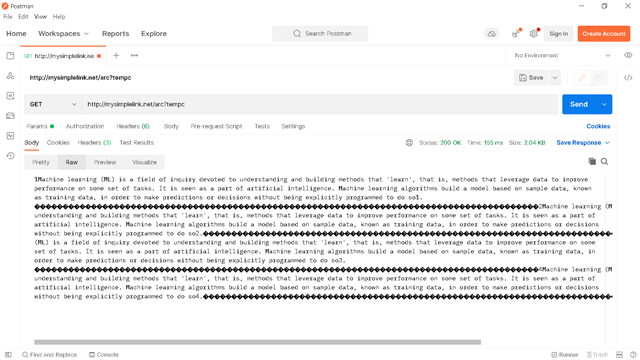
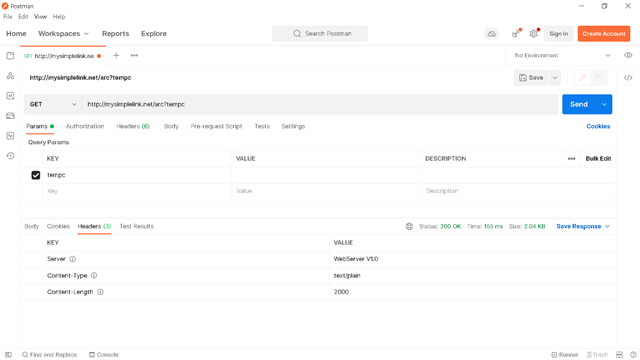
But when I try sending more fragments or/and four fragments with larger size it stuck is the request only and then show 404 error as shown below -
int32_t dataGetCallback(uint8_t requestIdx, uint8_t *argcCallback, uint8_t **argvCallback, SlNetAppRequest_t *netAppRequest)
{
uint8_t *pPayload;
uint16_t metadataLen, sendDatalen;
char sendDataStr1[500] = "1Machine learning (ML) is a field of inquiry devoted to understanding and building methods that 'learn', that is, methods that leverage data to improve performance on some set of tasks. It is seen as a part of artificial intelligence. Machine learning algorithms build a model based on sample data, known as training data, in order to make predictions or decisions without being explicitly programmed to do so1.";
char sendDataStr2[500] = "2Machine learning (ML) is a field of inquiry devoted to understanding and building methods that 'learn', that is, methods that leverage data to improve performance on some set of tasks. It is seen as a part of artificial intelligence. Machine learning algorithms build a model based on sample data, known as training data, in order to make predictions or decisions without being explicitly programmed to do so2.";
char sendDataStr3[500] = "3Machine learning (ML) is a field of inquiry devoted to understanding and building methods that 'learn', that is, methods that leverage data to improve performance on some set of tasks. It is seen as a part of artificial intelligence. Machine learning algorithms build a model based on sample data, known as training data, in order to make predictions or decisions without being explicitly programmed to do so3.";
char sendDataStr4[500] = "4Machine learning (ML) is a field of inquiry devoted to understanding and building methods that 'learn', that is, methods that leverage data to improve performance on some set of tasks. It is seen as a part of artificial intelligence. Machine learning algorithms build a model based on sample data, known as training data, in order to make predictions or decisions without being explicitly programmed to do so4.";
char sendDataStr5[500] = "4Machine learning (ML) is a field of inquiry devoted to understanding and building methods that 'learn', that is, methods that leverage data to improve performance on some set of tasks. It is seen as a part of artificial intelligence. Machine learning algorithms build a model based on sample data, known as training data, in order to make predictions or decisions without being explicitly programmed to do so5.";
pPayload = gPayloadBuffer;
sl_Memcpy (pPayload, sendDataStr1, sizeof(sendDataStr1));
pPayload += sizeof(sendDataStr1);
// /* NULL terminate the payload */
*(pPayload) = '\0';
sendDatalen = sizeof(sendDataStr1) + sizeof(sendDataStr2) + sizeof(sendDataStr3)+ sizeof(sendDataStr4)+sizeof(sendDataStr5);
metadataLen = prepareGetMetadata(0, sendDatalen, HttpContentTypeList_TextPlain);
pthread_mutex_lock(&spiMutex);
sl_NetAppSend (netAppRequest->Handle, metadataLen, gMetadataBuffer, (SL_NETAPP_REQUEST_RESPONSE_FLAGS_CONTINUATION | SL_NETAPP_REQUEST_RESPONSE_FLAGS_METADATA));
sl_NetAppSend (netAppRequest->Handle,sizeof(sendDataStr1), gPayloadBuffer, SL_NETAPP_REQUEST_RESPONSE_FLAGS_CONTINUATION); /* mark as last segment */
pPayload = gPayloadBuffer;
sl_Memcpy (pPayload, sendDataStr2, sizeof(sendDataStr2));
pPayload += sizeof(sendDataStr2);
// /* NULL terminate the payload */
*(pPayload) = '\0';
sl_NetAppSend (netAppRequest->Handle,sizeof(sendDataStr3), gPayloadBuffer, SL_NETAPP_REQUEST_RESPONSE_FLAGS_CONTINUATION); /* mark as last segment */
pPayload = gPayloadBuffer;
sl_Memcpy (pPayload, sendDataStr3, sizeof(sendDataStr3));
pPayload += sizeof(sendDataStr3);
// /* NULL terminate the payload */
*(pPayload) = '\0';
sl_NetAppSend (netAppRequest->Handle,sizeof(sendDataStr3), gPayloadBuffer, SL_NETAPP_REQUEST_RESPONSE_FLAGS_CONTINUATION); /* mark as last segment */
pPayload = gPayloadBuffer;
sl_Memcpy (pPayload, sendDataStr4, sizeof(sendDataStr4));
pPayload += sizeof(sendDataStr4);
//// /* NULL terminate the payload */
*(pPayload) = '\0';
sl_NetAppSend (netAppRequest->Handle,sizeof(sendDataStr4), gPayloadBuffer, SL_NETAPP_REQUEST_RESPONSE_FLAGS_CONTINUATION); /* mark as last segment */
pPayload = gPayloadBuffer;
sl_Memcpy (pPayload, sendDataStr5, sizeof(sendDataStr5));
pPayload += sizeof(sendDataStr5);
//// /* NULL terminate the payload */
*(pPayload) = '\0';
sl_NetAppSend (netAppRequest->Handle,sizeof(sendDataStr5), gPayloadBuffer, 0); /* mark as last segment */
pthread_mutex_unlock(&spiMutex);
return 0;
}
The response of the client in Postman is shown below (same response occurred in html page) --

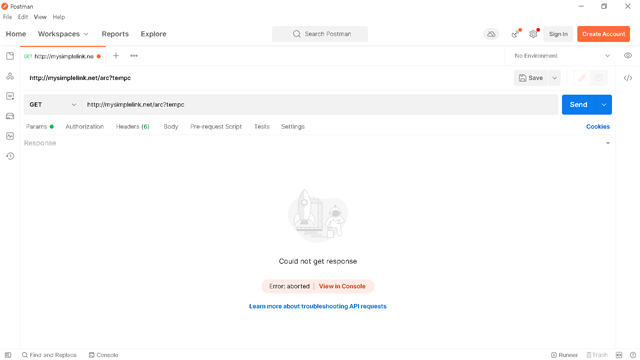
When the next request is placed then it shows 404 error after 30 s -
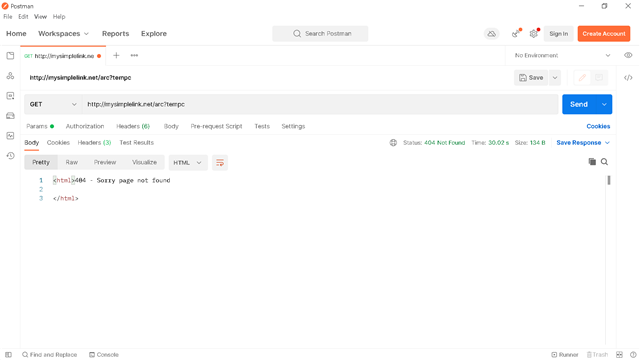
Can anyone help, whats wrong going here?
Thanks & Regards,
Kuldeep


